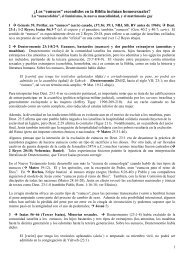Deuteronomy: - Fundación Otras Ovejas de Argentina
Deuteronomy: - Fundación Otras Ovejas de Argentina
Deuteronomy: - Fundación Otras Ovejas de Argentina
You also want an ePaper? Increase the reach of your titles
YUMPU automatically turns print PDFs into web optimized ePapers that Google loves.
� If a man is caught lying with the wife of another man, both of them shall die…..<br />
� If there is a young woman, a virgin already betrothed to be married, and a man meets her and lies with her,<br />
you shall… stone them to <strong>de</strong>ath, the young woman because she did not cry for help…..<br />
� If the man meets the betrothed woman in the open country, and the man seizes her and lies with her, then<br />
only the man who lay with her shall die…. But there was no one to rescue her.<br />
� If a man meets a virgin who is not betrothed, and seizes her and lies with her… the man… shall give fifty<br />
shekels of silver to the…father, and she shall become his wife… he shall not be permitted to divorce her as<br />
long as he lives. (Deut. 22:22-29)<br />
3.5 ―Incest‖ with the father‘s wife (22:30 // 27:20); � Leviticus 18 and 20; 1 Corinthians 5; ―incest‖<br />
with a sister (27:22) or mother-in-law (27:23); � Lev. 18:9,8 (Gen. 9:21-29 + patriarchs). Although the Exodus<br />
co<strong>de</strong>s did not inclu<strong>de</strong> any prohibition against relations which today are <strong>de</strong>signated as ―incestuous,‖ <strong>Deuteronomy</strong><br />
prohibits three such relationships in four texts, a theme much more <strong>de</strong>veloped in � Leviticus 18 (twelve<br />
prohibitions) and 20 (seven prohibitions with the <strong>de</strong>ah penalty). The prohibition of relations with a father‘s wife<br />
(22:30 // 27:20) makes explicit that the principal purpose is to avoid violating the father‘s honor. (See Absolom<br />
taking David‘s concubines in or<strong>de</strong>r to replace him as king (2 Sam. 16:21-22; � 1-2 Samuel; Adonijah indirectly<br />
asking Solomon for Abishag, � 1 Kings 2:13-25).<br />
*3.6 Prohibitionof remarriage with the same woman after a divorce, 24:1-4; � Mark, Ezra, Nehemiah,<br />
Malachi. Although this text is commonly interpreted as a reference to divorce, it <strong>de</strong>als rather with a more concrete<br />
case: a prohibition of remarriage with a previously rejected woman. In the original Hebrew, 24:1-4 is just one<br />
sentence: the <strong>de</strong>scription of the case extends for three verses (vv. 1-3), followed by the prohibition in v. 4 (see<br />
NIVSB note). As in Isaiah 50:1, the prohibition takes for granted (1) that divorces are going to occur and does not<br />
prohibit them and (2) that the man will give the woman a certificate of divorce. The law does not seek to <strong>de</strong>fine a<br />
legitimate basis for the divorce (´erwat, ―something displeasing,‖ v. 1, is intentionally vague), and we should not<br />
conclu<strong>de</strong> from this law that only men can initiate a divorce (see the Levite‘s concubine, � Judges 19:2). 51<br />
*3.7 Levirate marriage (with the widow of a <strong>de</strong>ceased brother), Deut. 25:5-10 (cf. Genesis 38; Lev.<br />
18:16; 20:21; � Mark 12:18-27 // Mat. 22:23-33). A unique exception to the levitical prohibitions of incest is the<br />
law in Deut. 25:5-10 regarding levirate mariage (from the Latin levir, brother-in-law) which, in effect, commands<br />
what Leviticus (18:16 and 20:21) prohibits. If a brother died without a <strong>de</strong>scendant, the surviving brother was<br />
obligated to have sexual relations with the widowed sister-in-law in or<strong>de</strong>r to ensure the continuity of the brother‘s<br />
name (lineage). In addition to the discrepancy with the Levitical laws against incest, Biblical scholars have noted<br />
several differences between the narratives (Tamar in Genesis 38 + Ruth): 52<br />
� In Genesis 38 the widow Tamar only had the right to a <strong>de</strong>scendant, not marriage (as in Ruth and<br />
Deuteronomic law), which provoked consi<strong>de</strong>rable difficulty for the biblical notion that sexuality implied a<br />
permanent marital relationship;<br />
� Deut. 25:5-10 limits Levirate marriage to the brothers who ―resi<strong>de</strong> together,‖ but in Genesis 38 the<br />
responsibility extends to the father-in-law (Judah) and in Ruth to someone else even more distant (Boaz, relative of<br />
the mother-in-law Naomi);<br />
� In Genesis and <strong>Deuteronomy</strong> levirate marriage is obligatory, but in Ruth it is optional.<br />
� Deut. 25:7 stipulates that the brother‘s responsibility is to perpetuate the name of the <strong>de</strong>ceased brother;<br />
however, Ruth‘s geneology (Ruth 4:18-21) names only the biological father (Boaz), not the person whose place he<br />
took (Mahlon).<br />
In the day of questions Jesus was obligated to <strong>de</strong>al with this question (� Mark 12:18-27 // Matthew 22:23-33).<br />
His answer inclu<strong>de</strong>d the affirmation that angels do not marry, which in the Neoplatonic tradition was interpreted as<br />
17

















